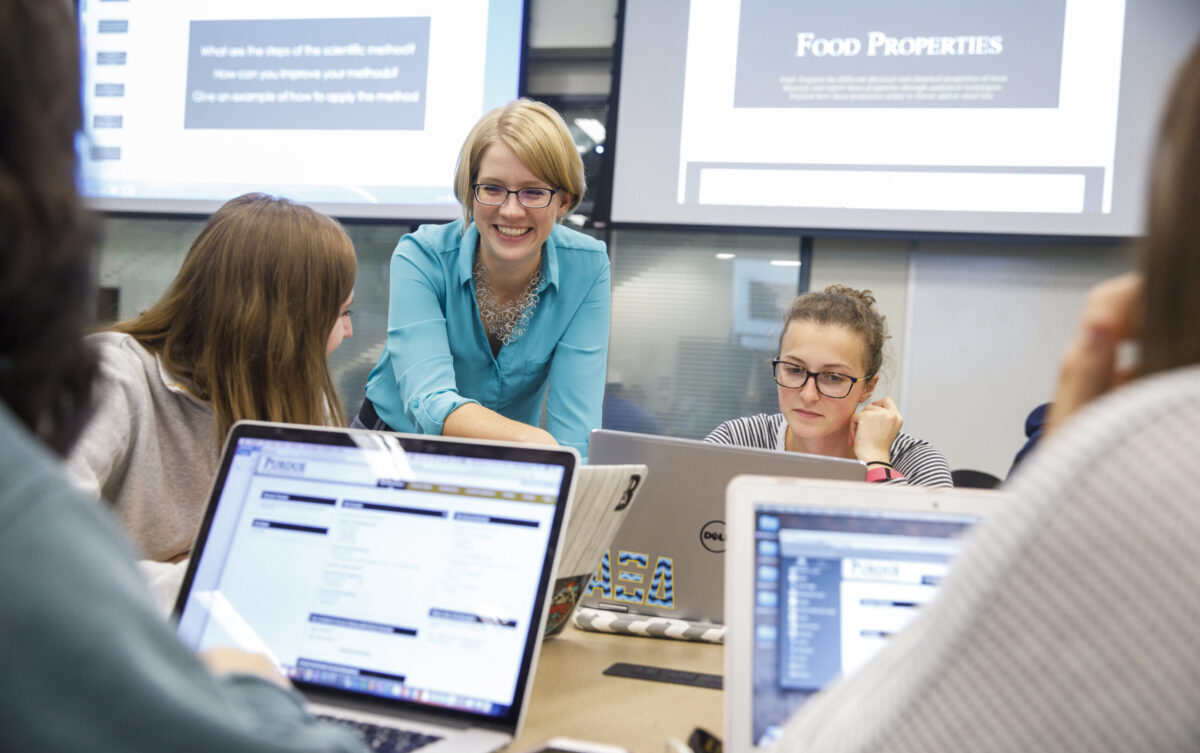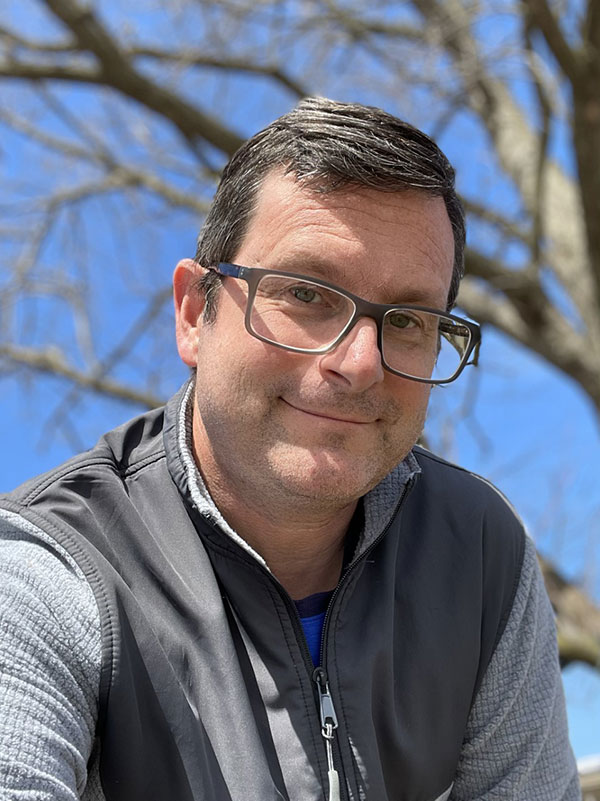Teaching innovation award encourages faculty to take risks, enhance education
Written By: Rebecca Hoffa, rhoffa@purdue.edu

Cori Running, assistant professor of nutrition science, received the Patsy J. Mellott Teaching Innovation Award in 2016.
From bringing the lab into students’ homes to elevating students’ internship experiences and developing new simulation opportunities, the Patsy J. Mellott Teaching Innovation Award has fostered many innovative ideas in the Purdue University College of Health and Human Sciences (HHS). The most recent award recipients, Becky Good and Janelle Potetz in the School of Nursing, will be integrating a flexible simulation program as part of four nurse practitioner graduate clinical courses to combat clinical placement challenges due to availability.
Established in 2013 by nutrition science alumna Patsy J. Mellott, the award recognizes and helps HHS faculty or small groups of faculty complete innovative projects that will improve students’ education. The award provides up to $2,500 for one year and has not only transformed students’ experiences across a variety of programs but also offered opportunities for the college’s faculty to take their teaching to a new level.
“This is the opportunity to really improve and examine your own program, teaching and outcomes, and see where you are having gaps,” said Scott Lawrance, a past recipient of the award and clinical professor in the Department of Health and Kinesiology. “You have an avenue to fill that. This award has really helped us fill a void in what we were offering and helped strengthen our overall product.”
A recipe for flexible learning
When she won the award in 2016, Cori Running, assistant professor in the Department of Nutrition Science, wanted to bring a distance learning option to her food chemistry class, making the course more flexible and widely available to students who may be interested. In doing so, she adapted classroom materials to allow students to bring the experiments into their own kitchens using everyday products from the grocery store.
“I think it helps the students actually find the science a little more approachable because they can feel and see and taste the outcomes,” Running said.
While the instructional materials started in her NUTR 45300 (Food Chemistry) course, they have since been downloaded more than 7,000 times in locations around the world, making a difference in classrooms beyond Purdue.
“I don’t think I’ll even know the extent to which this might impact education and people’s learning in realms and classrooms and fields I’ll never even hear about because of the level of usage it appears to be getting,” Running said.
Currently, Running is working to translate her course to the master’s level, granting more flexibility for graduate students studying nutrition science.
“We’ve got to start somewhere if we want to make science education more accessible to people who don’t have the mobility or flexibility that we typically see for your average undergraduate or graduate student in science,” Running said. “The assumption is that you’re going to move to wherever the university is, and that’s just not possible for a lot of people who might have interest.”
Advancing athletic training on and off the field

Scott LawrancePhoto provided
In 2019, Lawrance’s proposal for the award sought to leverage simulation with reflection to help students practice and review athletic training scenarios in a low-risk environment. Lawrance developed a simulation lab in Lambert Fieldhouse where students can engage in simulations — watching the scenarios in real time on a screen. The simulation lab also allows Lawrance to supervise his students remotely through his phone and offer feedback through an intercom in the lab.
“It’s a nice way for us to bridge the gap between things they commonly see and can do in a safe manner with a live patient and things that are rare or they couldn’t do without harming a patient,” Lawrance said. “There’s something very powerful with a student being able to watch their own actions and to reflect and debrief.”
Because memory isn’t always reliable, especially in high-stakes evaluations, Lawrance noted that students have benefitted from being able to watch how they performed in these simulations and build their confidence before they begin practicing on live patients.
Lawrance received his award right before the COVID-19 pandemic changed education completely, and he noted that the simulation lab helped students be able to get hands-on experience, despite not being able to work with live patients. As pandemic restrictions are lessening, Lawrance noted that the department is getting to use the simulation technology even more. In addition to the simulation lab, Lawrance also purchased a robot that follows simulations away from the lab, such as in Ross-Ade Stadium or other athletic complexes.
“It’s all about improving their ability to take concepts and skills from class and practice them in a low-stakes environment before we put them in a patient-care scenario,” Lawrance said.
Exercising students’ mental fitness

George HollichPhoto provided
George Hollich, associate professor of psychological sciences, and senior lecturers Jill Gulker and Erin Sparks Ward in the Department of Psychological Sciences were awarded last year’s Patsy J. Mellott Teaching Innovation Award. After noticing the burn-out and stress students were experiencing due to the COVID-19 pandemic, the team decided to create a “psychological fitness lab,” where students could access resources and focus on optimizing various psychological aspects in their lives, whether that be their productivity, happiness or another area.
While the team aims for this innovation project to eventually benefit the Purdue community and beyond, they’re starting with the students in their own courses, integrating a series of video modules and discussion forums into their introductory psychological sciences courses.
“We thought this was a really good setting where we can talk about the biology, the psychology and the social aspect of psychology to help students think about how they can optimize those various aspects of their lives,” Hollich said.
Hollich received great feedback from the students, who indicated they appreciate an opportunity to explore these topics and felt as though their voice was being heard.
“The students definitely report that they like that aspect of the course,” Hollich said. “Oftentimes when you’re learning about mental health, that’s one unit, one time, so you want to have that spread out over the course so students have immediate access to it.”
However, Hollich noted that this impact they’ve had on student learning wouldn’t be possible without Patsy Mellott’s generosity and support. “It’s a very freeing aspect to say, ‘Let’s try something really out there and see if we can put it together,’” Hollich said. “That’s what this award really helps you do — not just a simple course change or curriculum change but a real paradigm change in how we do something.”
Discover more from News | College of Health and Human Sciences
Subscribe to get the latest posts sent to your email.